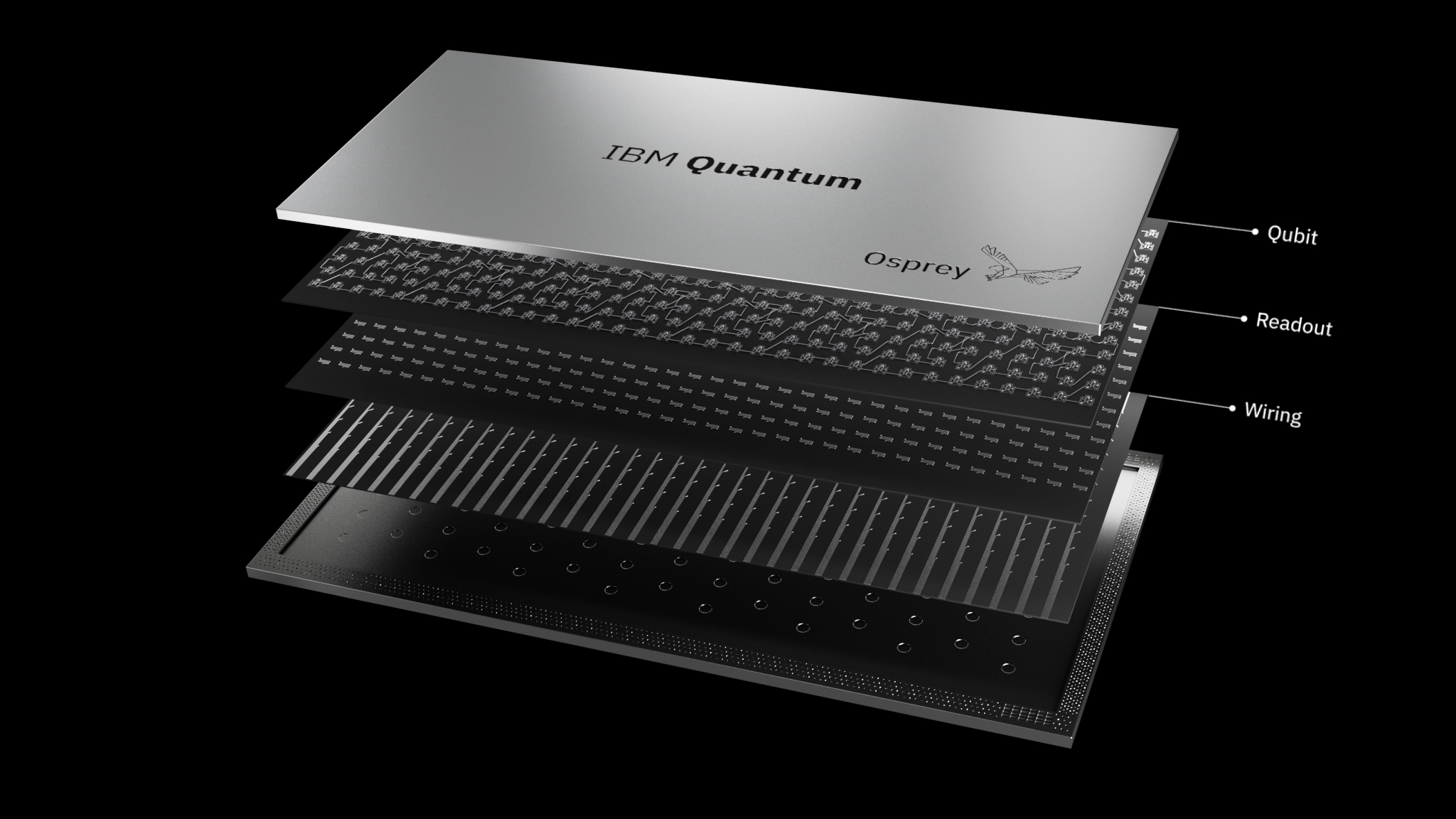

Osprey quantum processor. Image credit: IBM
IBM continues to advanced its quantum computing expertise, after it unveiled the world’s most powerful quantum processor called the Osprey.
Big Blue announced the Osprey on Wednesday, which is a 433-qubit system that has three times the number of qubits than its Eagle machine that was announced last year.
In November 2021 IBM had claimed a breakthrough in quantum computing, with its Eagle processor that delivered “127 qubits on a single IBM quantum processor for the first time with breakthrough packaging technology.”
But a year later and IBM at the annual IBM Quantum Summit, took the opportunity to showcase its continued progress to bring useful quantum computing to the world.
“The new 433 qubit ‘Osprey’ processor brings us a step closer to the point where quantum computers will be used to tackle previously unsolvable problems,” said Dr. Darío Gil, senior VP at IBM and director of research.
“We are continuously scaling up and advancing our quantum technology across hardware, software and classical integration to meet the biggest challenges of our time, in conjunction with our partners and clients worldwide,” said Dr. Gil.” This work will prove foundational for the coming era of quantum-centric supercomputing.”
At the heart of the breakthrough is the IBM’s new 433-quantum bit (qubit) processor.
IBM Osprey has the largest qubit count of any IBM quantum processor, more than tripling the 127 qubits on the IBM Eagle processor unveiled in 2021.
IBM said this processor has the potential to run complex quantum computations well beyond the computational capability of any classical computer. For reference, the number of classical bits that would be necessary to represent a state on the IBM Osprey processor far exceeds the total number of atoms in the known universe.
Quantum computing is expected to revolutionise the way computers work by using building blocks whose functionality draws on quantum effects.
Want to know more about practical quantum computers and what this could mean for your business? Click here to read Silicon UK’s ‘Qubits Are Coming‘
But their principles are fundamentally different from those of classical computers, with quantum qubits, for instance, able to hold multiple states, in contrast to the two possible states of a digital bit.
As a result, many of the companies such as Google, IBM and Microsoft that are investing in developing quantum computers, are also looking to work with programmers to build their familiarity with quantum computing concepts.
IBM meanwhile also addressed the issue of noise in quantum computers, which continues to be an important factor in adoption of this technology.
To simplify this, IBM released a beta update to Qiskit Runtime, which now includes allowing a user to trade speed for reduced error count with a simple option in the API.
IBM said that by abstracting the complexities of these features into the software layer, it will make it easier for users to incorporate quantum computing into their workflows and speed up the development of quantum applications.
It should be remembered that IBM had in 2019 unveiled its IBM Quantum System One, the world’s first integrated quantum computing system.
Since then, IBM deployed these systems as the foundation of its cloud-based IBM Quantum services in the United States, as well as in Germany for Fraunhofer-Gesellschaft (Germany’s leading scientific research institution) plus other locations.
IBM has over 20 quantum computers around the world, and customers can access them through the cloud.
But now IBM’s next-generation quantum system has also updated, as the systems scale up towards the stated goal of 4,000+ qubits by 2025 and beyond – well beyond the current capabilities of existing physical electronics.
IBM Quantum System Two is designed to be modular and flexible, combining multiple processors into a single system with communication links.
For example IBM said it could build a system with up to 16,632 qubits by linking three of these systems.
This system is targeted to be online by the end of 2023 and will be a building block of quantum-centric supercomputing – the next wave in quantum computing which scales by employing a modular architecture and quantum communication to increase its computational capacity, and which employs hybrid cloud middleware to seamlessly integrate quantum and classical workflows.
IBM also revealed that German conglomerate Bosch has joined the IBM Quantum Network to explore a variety of quantum use cases.
IBM has been developing its quantum computing capabilities for years now.
In 2016 it made quantum computing available to the public as a cloud-based on-demand service for use in quantum processing experiments.
Then in 2017 IBM became the first company to begin building a commercial programme around early-stage general-purpose quantum computers.
Elon Musk sells social media platform X to his AI start-up xAI in a move…
TikTok opens e-commerce shopping in Germany, France, Italy as US future remains uncertain over divest-or-ban…
Discover expert insights on overcoming digital transformation challenges. Learn how to manage change, balance innovation,…
Microsoft drops data centre projects amounting to 2 gigawatts of power consumption as investors question…
SMIC sees revenues rise 27 percent for 2024, but profits fall nearly 50 percent amidst…
Google reassures developers Android to remain open source as it brings development entirely in-house, reduces…